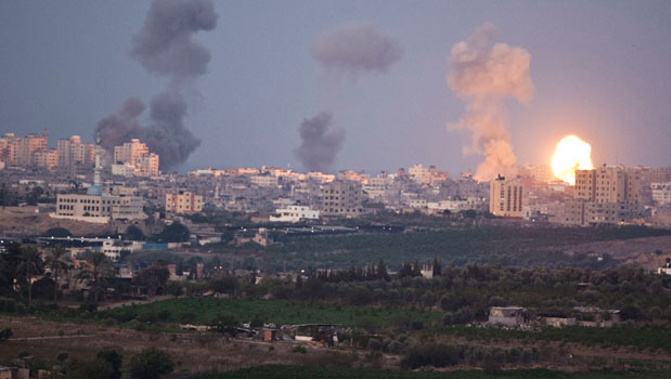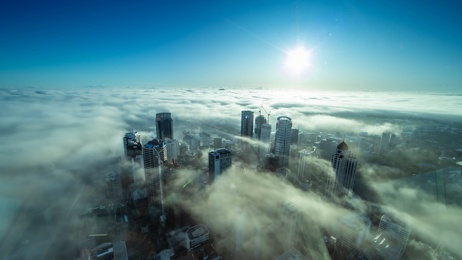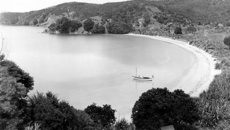
It is difficult to write about New Zealand’s election campaign without experiencing pangs of guilt. Here we are, five million of us, tucked away safely at the bottom of the world, grumbling and grousing about our political choices. Forgetting what an enormous privilege it is to be able to grumble and grouse about the responsibilities of democracy.
At this moment there are two million terrified human-beings cowering in the rubble that was Gaza. They have so much more to grumble and grouse about than we supremely fortunate New Zealanders. For the past 17 years, grumbling and grousing about their Hamas leaders is the sort of activity that has got Gazans locked-up – or worse. And now, those same Hamas leaders, by unleashing fire, terror and death upon the inhabitants of southern Israel, have brought down upon their powerless citizens the implacable wrath of the Israeli state.
How many Gazans would have voted for a government that promised to rain down rockets on its neighbours? How many would have voted for the indiscriminate slaughter of men, women, and children for the sin of being Jewish? How many would have voted for a party determined to provoke the retaliation of one of the most dangerous military forces on the face of the planet? Some. Of that there can be little doubt. Some Gazans would have voted for all of those things. But, a majority? Probably not. Especially if the citizens of Gaza had been free to chose between Hamas and parties seeking reconciliation and peace.
For those New Zealanders who grumble and grouse about democracy being nothing more than the “tyranny of the majority” the situation in Gaza should be instructive. Certainly, it demonstrates to the world what tyranny looks like. Revealing the terrible harm that can be inflicted upon a community by those who refuse to – and cannot be – held accountable for their actions. Mostly, however, what Gaza shows us, in the most unequivocal fashion, is that no matter how bad the so-called “tyranny of the majority” is purported to be, it bears no comparison with the terror and horror that always accompanies the tyranny of the minority.
It is, however, worth asking what was going through the minds of the Palestinian voters of Gaza when, in 2006, as free citizens, they embraced the manifesto of Hamas and hoisted it into government. Remember, this was before they discovered that, having voted Hamas in, they were not going to be permitted to vote Hamas out. At the back of their minds, as they read the stirring words of the radical Islamicist party’s propagandists, they probably nurtured the comforting thought that: “If these guys go too far, we can always get rid of them.” In the meantime, a Hamas government in Gaza will show up the infirmities of the Palestinian Authority, and give a one-fingered salute to both Fatah and the Israelis.
Naïve? Of course they were. Not one of them could have been unaware that they were voting for men with guns – terrorists with guns. Crowning such men with the garlands of democratic legitimacy. Investing them with all the powers of the state. How could they not have known, in their heart-of-hearts, that what they were doing was bound to end badly? When the Devil comes knocking, only the every wicked, or the very foolish, invite him in.
Naturally, a Gazan would respond by pointing to the grim record of Israeli occupation. They would rehearse the tragic details of the Nakba (catastrophe). The loss of their land, their olive groves, their businesses, their houses – and their rights. They would accuse the Zionists of colonising Palestine at the point of Czech-manufactured machine-guns – while the world averted its gaze. They would relate how they waited, in vain, for their Arab brothers in Egypt, Syria and Jordan to make good on their promises to liberate Palestine. Watching, helpless, as the Israelis crushed every Arab army sent against them. How their young people had risen up – and been shot down. “With a history like that,” they would say, “wouldn’t you feel tempted to vote for the men with guns?”
It is the great good fortune of New Zealanders not to have reached the point where such dangerous questions are being asked. With the exception of the proto-terrorists, tracked as they trudged through the Urewera bush back in 2007, and the very real lone-wolf terrorist who gunned down 51 Muslim worshippers in Christchurch in 2019, New Zealanders have not had to contend with armed politicos for more than century. But, that does not mean that arriving at such a dangerous point is impossible.
The election that will conclude tomorrow evening is being contested by at least three parties accused of promoting policies with, at the very least, the potential to inspire serious political violence. Labour, the Greens and Te Pāti Māori have all declaimed against the tyranny of the majority, and all three are committed to debasing the democratic currency of “one person, one vote, one value” by intruding ethnic considerations into the governance of significant national institutions. All three are similarly committed to the “decolonisation” and “indigenisation” of New Zealand, in accordance with their radical interpretation of Te Tiriti o Waitangi.
At least one of the three other parties vying for power in this election is committed to a policy which would render Labour’s, the Greens’ and Te Pāti Māori’s “co-governance” plans inoperative. Act is determined to dethrone the radical reading of Te Tiriti and replace it with a simple restatement of the document’s historically accepted meaning. It is this latter version of Te Tiriti which Act’s leader, David Seymour, intends to give the force of law, with the consequential legislation endorsed, or rejected, by a simple majority, in a binding referendum. Were the Act Party to succeed in “re-writing” Te Tiriti in this fashion, it would almost certainly inspire massive resistance from a great many Māori – and Pakeha.
This puts the people of New Zealand on a path not entirely dissimilar to the path trodden by the people of Gaza. Nationalism, coupled with a determination to resist what nationalists believe to be the alien and illegitimate regime that “stole” their land and extinguished (almost) their national identity has, historically, proven itself to be an ideological proposition worth dying – and killing – for. It is the reason why the battle for Israel/Palestine is so intractable. It is a conflict between two mutually exclusive national narratives.
A similar conflict is fast developing here, characterised by some as the struggle between the “old” declining New Zealand, and “young” emerging Aotearoa. In this election, however, the contest is being represented as a struggle between Democracy and Co-governance. Sadly, the defeat of one by the other is certain to speed-up and intensify the polarisation of New Zealand society. To the point where, when the Devil comes knocking, the losing side will, wickedly or foolishly, open the door.
Take your Radio, Podcasts and Music with you









